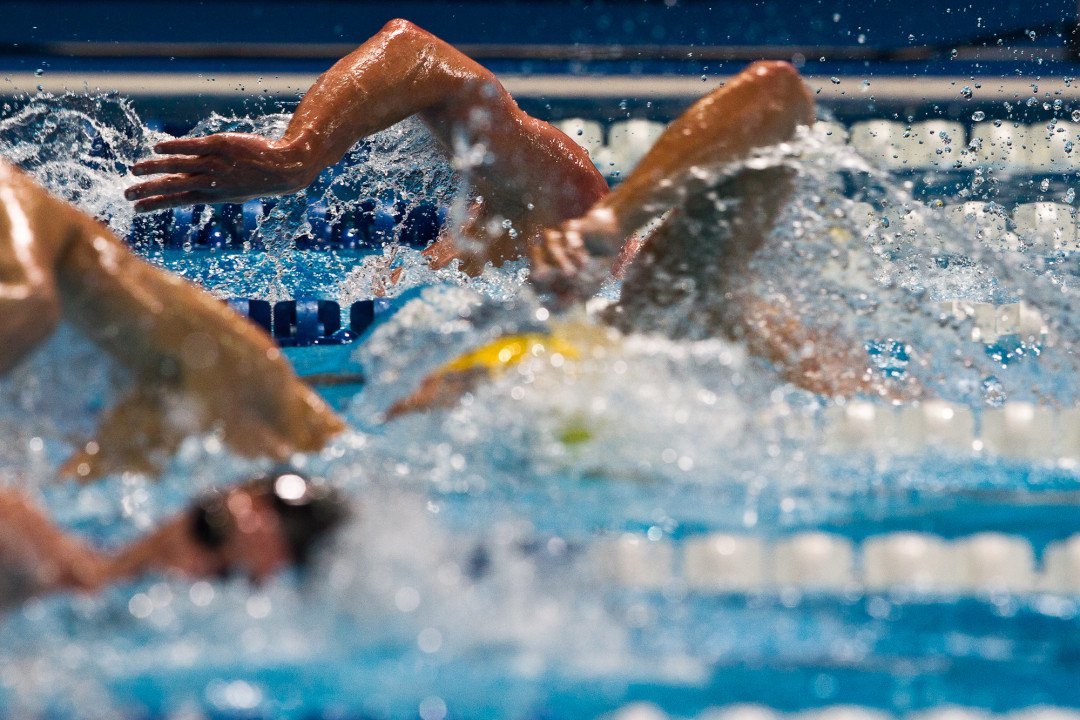Olivier Poirier-Leroy is a former national level swimmer based out of Victoria, BC. In feeding his passion for swimming, he has developed YourSwimBook, a powerful log book and goal setting guide made specifically for swimmers. Sign up for the YourSwimBook newsletter (free) and get weekly motivational tips by clicking here.
In today’s Coach’s Intel Michael Fleming, head coach of the McGaw YMCA Swim Team in Evanstown, Illinois. He is entering his 4th year with MYST, is an ASCA Level 3 certified coach, and has sent numerous swimmers to finals at YMCA nationals.
Here is his set:
This is a set I would use to help swimmers with their 200/500 pacing. I have a wide range of abilities within our group so sets like this that aren’t tied too much to an interval are really beneficial to me and allows each swimmer to get something out of it. We have some swimmers that cannot get on their 200 pace in a set like this than I would ask them to focus more on 500 speed.
I am really looking for easy speed on the 50’s and trying to get the swimmers to get on their paces with as little effort as possible. The 100’s are obviously harder and just looking for the swimmers to get up and race, while trying to maintain their stroke as best they can.
6 x 50 @ 1:00 – 200/500 pace
2 x 100 @ 1:30 recovery
1 x 100 @ 1:30 – 50 times x 2
4 x 50 @ :45 recovery
Second time through we would drop two 50’s and add one 100:
4 x 50 @ 1:00 – 200/500 pace
2 x 100 @ 1:30 recovery
2 x 100 @ 1:30 – 50 time x 2
4 x 50 @:45 recovery
3rd time through we would drop another two 50s and add another 100:
2 x 50 @ 1:00 – 200/500 pace
2 x 100 @ 1:30 recovery
3 x 100 @ 1:30 50 time x 2
4 x 50 @ :45 recovery
About YourSwimBook
 YourSwimBook is a log book and goal setting guide designed specifically for competitive swimmers. It includes a ten month log book, comprehensive goal setting section, monthly evaluations to be filled out with your coach, and more. Learn 8 more reasons why this tool kicks butt.
YourSwimBook is a log book and goal setting guide designed specifically for competitive swimmers. It includes a ten month log book, comprehensive goal setting section, monthly evaluations to be filled out with your coach, and more. Learn 8 more reasons why this tool kicks butt.
Join the YourSwimBook weekly newsletter group and get motivational tips and more straight to your inbox. Sign up for free here.

1×100’s@1:30 at 200 pace (goal 200/2) would be extremely difficult from push after repeat 50’s at 200 pace given the recovery-particularly for jr national level swimmers and above. Multiple 100’s@1:30 at 200 pace would be nearly impossible after 50’s@200 pace.
I think this set would work better in reverse. Start w 3×100’s and work their way down.
I could see in season best being possible for those 100s (agreeing they may best be served at the beginning of each round, 3 – 2 -1 by round) and resulting in more successful attempts then 200FR PR. 200FR PR of 1:36 is 3x :48 from a push on 1:30, what is the success rate of your swimmers doing this set and do they put correct effort into this: high intensity, very fast, but not Fly-and-Die? Or are we late to the game in these suggestions and you already do this for your 200 swimmers and progress towards PR times towards the end of the season?
When I use 200 pace, it is more second 100 time as opposed to straight 200/2 time. I have gone both ways in regards to build up the 100s and taken away. There is some fly and die in this method at the end, but i find my swimmers will go faster on the hardest part if it is at the end and they know thats all they have to do. If i lead with it then they tend to be a bit more cautious.